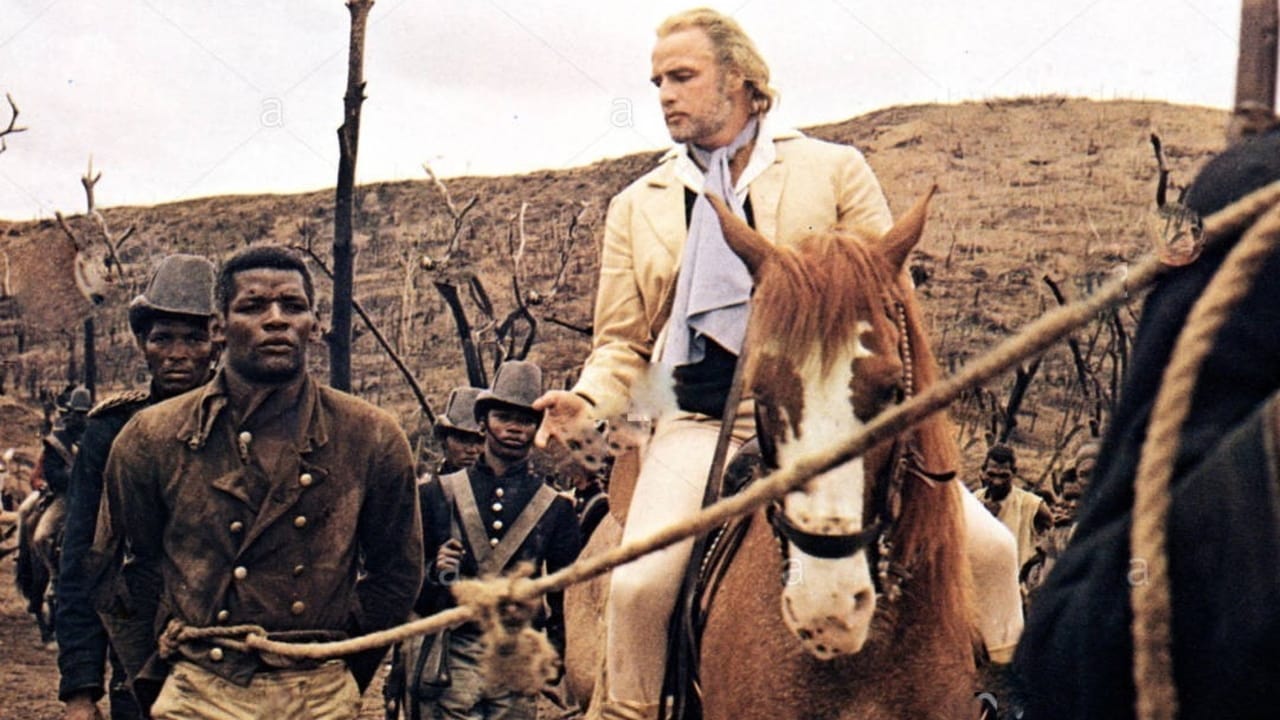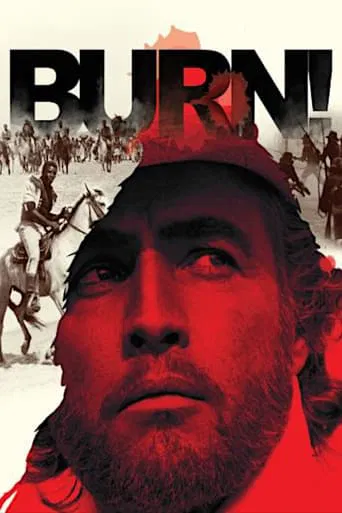

Why so much hype?
... View MoreI gave it a 7.5 out of 10
... View MoreEasily the biggest piece of Right wing non sense propaganda I ever saw.
... View MoreI enjoyed watching this film and would recommend other to give it a try , (as I am) but this movie, although enjoyable to watch due to the better than average acting fails to add anything new to its storyline that is all too familiar to these types of movies.
... View MoreQueimada is Pontecorvo's follow up to his critically acclaimed magnum opus, Battle of Algiers–an epic war movie based on the events surrounding the Algerian War. Queimada stars American movie-icon Marlon Brando in the lead role of a mercenary named Sir William Walker. At the time of its release, Queimada failed at the box-office resulting in huge financial loses. The major reason for movie's failure was the elimination of several politically sensitive scenes from the originally shot material. The highlight of the movie, apart from its controversial themes, is undoubtedly Brando's larger than life portrayal of Sir William Walker. In a career spanning over five decades, Brando gave a plethora of breathtaking performances which include the tour de force of a hot-headed brute in A Streetcar Named Desire, the Oscar-winning portrayal of an ex-prize fighter turned longshoreman trying to fight against the all-pervasive corruption in On the Waterfront, the icy portrayal of an outlaw betrayed by his partner in One-Eyed Jacks, the heart-wrenching portrayal of a recluse widower in Last Tango in Paris, and the unforgettable portrayal of an aging patriarch of an organised crime dynasty in The Godfather. Among the myriad of performances that Brando delivered during his long illustrious career, it's quite remarkable that he rated his portrayal of an agent provocateur in Pontecorvo's Queimada as his best ever. In his autobiography "Songs My Mother Taught Me", Brando revealed, "I did some of my best acting in 'Burn!'". Brando also admitted to it during an interview with Larry King on CNN as the latter, apparently disinterested in discussing a relatively unknown movie during the precious little time he had with the great actor, never allowed Brando to justify his choice.On the face of it, the movie deals with imperialism of the nineteenth century wherein colonial superpowers like England enslaved the black in the name of civilizing them–a seemingly moral obligation that the English laureate Rudyard Kipling so eloquently referred to as "The White Man's Burden". But, if one digs deeper the tale that is presented here appears to be both universal as well as timeless. A couple of centuries back, it was sugar that was perceived as a priced commodity, one that could make or break a fortune, but in the contemporary context, oil is the commodity that holds that coveted spot. Such is the power of Queimada that the conflict depicted in the movie can be aptly applied to several scenarios of past few decades. While in the movie it is the overambitious English sugar plantation company that held the actual sway over the Governments of Queimada as well as Great Britain, today we have petrochemical giants that happen to dictate their terms to the governments of the world. Queimada serves to be a smack in the face for all the perpetrators of mankind who have ever tried to exploit or patronize a certain oppressed section of humanity on the basis of color, creed, race, caste, sex, or religion.What makes Marlon Brando's portrayal singular is the element of unfathomable complexity associated with it. Sir William Walker is a ruthless mercenary, a filibuster, an agent provocateur, who knows no bounds when it comes to fulfilling his mission, and yet he has a certain element of humaneness that makes him likable. Behind the facade of a manipulative mercenary there exists a disgruntled, self- loathing persona trying desperately to escape his overwhelming guilt. Ironically, every move that he makes takes him deeper and deeper into the quicksand of his guilt as the escape becomes impossible. Brando's William Walker is a cross between a wolf and a sheep, a fiend and a beloved, an inflictor and a savior, a demon and an angel, a usurper and a guardian, a misanthrope and an altruist, and a mercenary and a messiah. It is this ambiguity that makes Brando's portrayal unique and remarkably magnificent. Walker is a gifted orator, a master manipulator, an opportunistic pacifier who dresses with the perfection of a fop. His aristocratic attire offers a striking contrast to the shabby appearance of the war-torn natives. Interestingly, Pontecorvo wanted Brando's portrayal of Sir William Walker to be out and out bad, but it Brando who insisted on putting up a grey-shaded caricature for Walker.Vintage Franco Solinas, Brando, during the course of the movie, gets to deliver some unforgettable lines, including a monologue in which he expatiates on the economics of using a paid worker vis-a-vis a slave by comparing it to the advantages of choosing a prostitute over a wife. However, my most favorite moment comes when Sir William Walker exhorts the power-hungry politicians of Queimada to offer amnesty to the guerrilla leader Jose Dolores warning them about the overwhelming power of a myth in comparison to a man, for unlike a man a myth cannot be killed and only grows to become a legend. Brando is well supported by the rest of the cast that mainly consists of Italian actors and amateurs. The team and Marcello Gatti and Giuseppe Ruzzolini have done wonders to movie's cinematography as the events seem to be taking place in front of the eyes rather than on the screen. Master composer Ennio Morricone's poignant music greatly complements the movie's motifs immensely adding to the beauty and power of the movie.Overall, Queimada serves to be a great specimen of filmmaking contributed by a great mix of direction, acting, screenplay, music, and cinematography. Pontecorvo triumphs in his great attempt to mock and mourn the plight of the oppressed indigenes during the colonial era while simultaneously presenting a great parallel to highlight the global crises post World War-II. Queimada may not serve to be the ideal sort of a cinematic experience for an average viewer, but it surely caters well to the needs of a thinking viewer who is not averse to getting out of his/her comfort zone in order to savor intelligent cinema.(This review was first published at A Potpourri of Vestiges)
... View MoreApparently, the Sir William Walker that Marlon Brando plays in this film isn't quite THE Sir William Walker! Let me explain. Walker was a real person who bore SOME similarity to the character in the film. However, the film took HUGE liberties with the guy's life. Instead of being an American, they make him British (which is odd--why not have Brando do a big stretch and just play an American?! Perhaps Brando just ADORED doing accents or he forgot his American one!) and a man who is indifferent towards or perhaps a bit anti-slavery in sentiments. However, Walker actually was practically the patron saint of slavers and fomented revolutions during the 19th century in order to re-institute slavery into Central America! Talk about not getting it right!! This is like doing a film where Santa hates children or General MacArthur is a pacifist!! This is a shame, as this real-life rogue would make a marvelous character in a movie as he led an amazingly colorful, albeit evil and self-serving life. And, in fact, they DID do such a film years later. "Walker", starring Ed Harris, claims to be the actual bio-pic of the guy and "Burn" is only very, very superficially his life story. Sadly, "Walker" is a terrible film--and despite the film saying it's all true...it isn't.How the film does get it right is that Walker was a professional trouble-maker. He literally bounced from one tiny country to another fomenting revolution for kicks--and in some cases in an attempt to make himself el Presidente for life. But, the film gets it wrong because much of his motivation in "Burn" is simply to destabilize Britain's enemies. And, frankly, this makes no sense because he WASN'T British and because by the 19th century no one really cared much about destabilizing Portugal. The reason they picked on poor Portugal in the and its colonies in the film is because the Spanish-speaking folks where they filmed the movie didn't like the idea that it might make Hispanics look bad--so they made the baddies Portuguese! Obviously historical accuracy was not terribly important to the filmmakers.If you ignore the historical mess that is this film, is it worth seeing? Yes, but it certainly is a bit muddled. The film is supposed to be about the evils of colonialism and later in the film it shows Walker actually regretting his actions in using a proud black man as his pawn. While this was a pretty interesting twist, the real Walker was a selfish jerk. My feeling is that if the film had been 100% fictional, it would have worked so much better. In addition, the pacing was a bit too slow, Brando's performance a bit too restrained and the music mind-numbingly repetitive. Overall, it's an interesting film but hardly a must-see.
... View MoreThis movie, I think one of the best movie about slavery, freedom, imperialism and colonization. Its tels the common history of Latin America through the island Queimada. The movie itself can be a subject of courses, but it is not an agitative the director uses casting very brilliantly. Do not evaluate the movie according to its IMDb point remember some awful Hollywood films can be in top 250. And I guarantee you you learn a lot from the movie like me! There are some hot arguments in the movie such as freedom. In the movie dolares says "freedom is not something to given but you take the freedom", and in the last scene director shows us the face of people of queimada, you see the anger but this anger means "hope of independence" last point watch the movie of the battle of Algiers and this movie together. Believe me although they are about different countries and different events but I feel that those movies are two parts of a common movie.
... View MoreThis by far stands up as Brando's best acting performance. Every scene he is in is riveting, to say the least. the movie could have bombed with any other leading man.The story's relevance is just as important today as when it was made. Several third world countries have their people enslaved by wealthy corporations working under the auspices of the IMF, World Bank, etc. The filmmakers were presenting us a warning to the horrors of globalization. Unfortunately, the message has not yet been headed.The filmmakers were smart to use Brando in almost every scene, as the scenes he was not in pale in comparison. The violence is kept to a minimum, just what was needed to tell the story, and the nudity was relegated to the local villagers, nothing gratuitous. The American DVD I saw clocked in at 117 minutes.As for Brando, Long live the King! As for BURN! don't miss it.
... View More